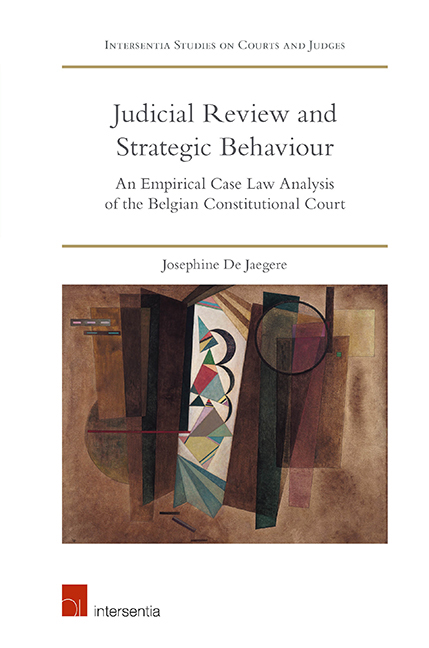 Judicial Review and Strategic Behaviour
Judicial Review and Strategic Behaviour Book contents
- Frontmatter
- Foreword
- Acknowledgements
- Contents
- Introduction
- PART I NORMATIVE FRAMEWORK: THE DELIBERATIVE PERFORMANCE OF CONSTITUTIONAL COURTS
- PART II THE CONTOURS OF JUDICIAL DECISION-MAKING
- PART III EMPIRICAL ANALYSIS OF THE BELGIAN CONSTITUTIONAL COURT'S CASE LAW
- Chapter 4 Translating Case Salience into Measurable Explanatory Variables
- Chapter 5 Case Outcomes
- Chapter 6 Citation Practices
- Chapter 7 Proportionality Analysis
- Conclusion
- Codebook
- Bibliography
- Index
- About The Author
Chapter 5 - Case Outcomes
from PART III - EMPIRICAL ANALYSIS OF THE BELGIAN CONSTITUTIONAL COURT'S CASE LAW
Published online by Cambridge University Press: 26 June 2019
- Frontmatter
- Foreword
- Acknowledgements
- Contents
- Introduction
- PART I NORMATIVE FRAMEWORK: THE DELIBERATIVE PERFORMANCE OF CONSTITUTIONAL COURTS
- PART II THE CONTOURS OF JUDICIAL DECISION-MAKING
- PART III EMPIRICAL ANALYSIS OF THE BELGIAN CONSTITUTIONAL COURT'S CASE LAW
- Chapter 4 Translating Case Salience into Measurable Explanatory Variables
- Chapter 5 Case Outcomes
- Chapter 6 Citation Practices
- Chapter 7 Proportionality Analysis
- Conclusion
- Codebook
- Bibliography
- Index
- About The Author
Summary
INTRODUCTION
Each case brought before the Court leads to a final dictum, which is the concluding part of the judgment and answers the raised constitutional question(s) (‘pleas’). Traditionally, empirical judicial behaviour studies focus on case outcomes, and in particular on the extent to which the ideological preferences of the individual judges determine whether challenged legislation is invalidated or not. Yet, for two reasons, the approach in this chapter is different.
First, in Belgium voting behaviour is not only concealed from the public, but the judicial outcome is also believed to be the result of a collegial effort. The BeCC, like most other European constitutional courts, needs to function within an institutional environment that is believed to reinforce the collegial dynamic of judicial decision-making. In particular, no dissenting opinions are allowed and the double parity rule prevents judges from pushing through their opinion without taking into consideration the concerns of other judges.
Second, a binary categorisation of case outcomes (invalidated or not) is too limited. Like in many other countries, the BeCC has developed diverse methods for answering a question of constitutionality. As mentioned before (section 2.6.) the law only allows the BeCC to reject the challenge or (partially) invalidate the unconstitutional provision(s). If legislation is invalidated, the Court can also temper the retroactive effect of this decision. However, the Court also proclaims ‘modulated outcomes’. In general, such creative outcomes indicate how the legislation should be interpreted or altered in order for it to be applied in a constitutional way.
Importantly, there are no (internal) rules determining whether the finding of a violation should lead to either a simple invalidation or a modulated outcome. Also, the Court holds a discretionary power to decide whether it is appropriate to temper the retroactive effect of its decision. Therefore, a study of case outcomes provides insights into how the Court addresses its audience, how this has developed over time, and why in some cases a particular outcome is considered more suitable than others.
- Type
- Chapter
- Information
- Judicial Review and Strategic BehaviourAn Empirical Case Law Analysis of the Belgian Constitutional Court, pp. 167 - 228Publisher: IntersentiaPrint publication year: 2019


